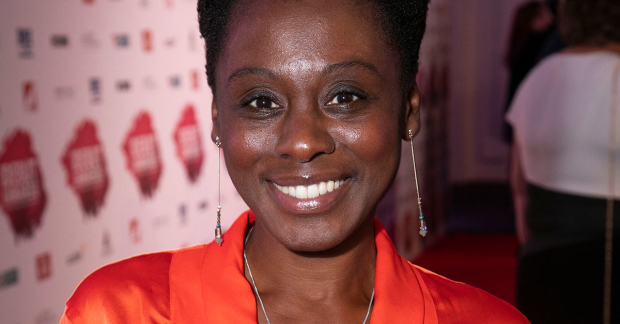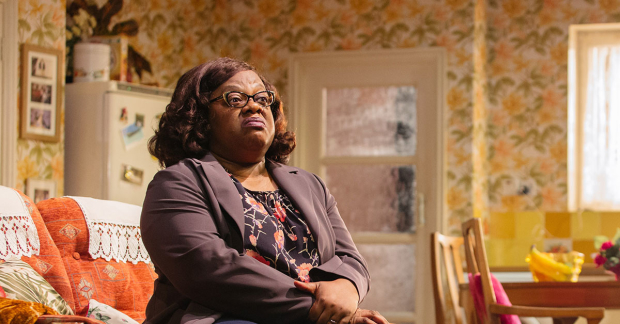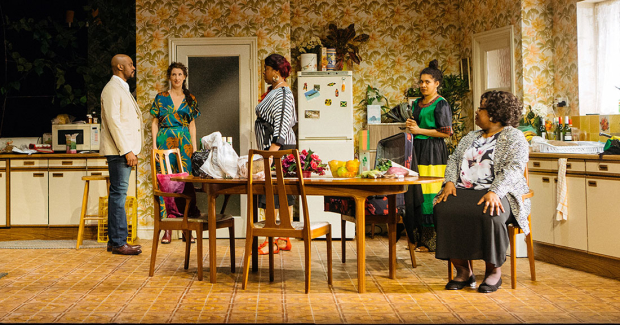Natasha Gordon: 'We should celebrate when we have six black British female playwrights in one year in the West End'
As she prepares to open in her play ”Nine Night” in the West End, writer and actress Natasha Gordon explains a little more about the remarkable Jamaican tradition and why she became a writer

© Dan Wooller for WhatsOnStage
Up until this year, Natasha Gordon was mostly known as an actress, starring in plays including Red Velvet at the Tricycle, Speechless at Sherman and As You Like It at the RSC as well as TV and film including Line of Duty and Class. That changed somewhat when the National Theatre read her very first play and announced they would be programming it in their 2018 season at the Dorfman. Nine Night is a domestic drama, set over nine days and nights where the family of the recently deceased Gloria come together to observe the Jamaican funeral tradition – also called Nine Night. Critical acclaim quickly followed the play's April opening – including the award for Most Promising Playwright in the Evening Standard Awards – and a transfer to Trafalgar Studios was announced, making Gordon the first black British female playwright to have a play on in the West End. Here she talks about the very personal inspiration for the play and why she turned her hand to writing in the first place.
First of all, congratulations on your Evening Standard Award nomination! [NB this interview took place before Natasha won on Sunday]
I can't really believe it. To be up for Most Promising Playwright is extraordinary. And to see Cecilia Noble [who stars in Nine Night] up for Best Actress and Roy [Alexander Weise who directs] up for Emerging Talent is just incredible.
Is the Nine Night tradition something you had experienced growing up?
I was completely new to it. I had heard of it, but if I had ever been to one as a child I couldn't remember it. It was when my grandma passed away four years ago that we decided to honour the tradition for her. I had no idea what to expect, and didn't have a clue really where it was from, what the significance of it was or why we were doing it. I've learnt subsequently about Nine Night from researching and writing the play.
What does observing it feel like? It is upbeat? Emotional?
It's such an individual experience. Not everybody does nine consecutive nights. Some people chose to celebrate one night, if they chose to celebrate it at all. For some people music is key to keep the spirits – not the supernatural, but one's mood – uplifted. Our granddad didn't want any music played, he put a padlock on the music system. Ours was lots of people, lots of booming voices, lots of laughter, lots of food, lots of drink. It's really what your family make of it.
And you and your family hosted while people dropped by?
I was just so exhausted. In the play, Lorraine is very much my voice. I was so overrun, with my siblings, making sure there was food to feed everyone and drinks, I didn't have time to stop and reflect about what we were doing. It was on the ninth night when my grandma's church friends, amazing women, came and prayed for about half an hour. I remember understanding something of what this tradition meant and why it was important for my grandma that we had done this.
What was it about that ninth night that made things click a bit?
She was religious and it was the sense that this intimate praying was taking place in her home. She was a woman who went to church most days of the week and to have the church brought to her home, in her front room, where she spent a lot of her time, really struck me.

© Helen Murray 2018
What was it then that made you decide to write a play about it?
I had started writing something about a year before, and I had always been intrigued by the difference between the Jamaican and Caribbean funerals I had been to and the British/English funerals. Also I was interested in the difference between burials and cremations and an event that takes place all day and in a church. So I had always been fascinated by that but didn't know what the thing I wanted to write might be. I was encouraged by a group of actresses who were also writing and it was when my grandma passed away I suddenly realised that I was very close to the experience. I hadn't even been sure I was writing a play. I was just exploring questions I had about the tradition and the matriarch and what happens generationally when you have lost touch with a tradition that is so deeply steeped in your roots.
You didn't star in the first run of the play, but you are starring now, why did you decide to take the part?
I hadn't written the play for myself, in fact when I was writing it the only person I had in mind that I knew I really wanted to be in it was Cecilia Noble to play Auntie Maggie. I had no interest in being in it because I wanted the experience of what it felt like to be a writer. But when the opportunity came up for this run, my partner said: "If you don't do this Tash, it would be pretty bonkers. I think you would regret it". Lorraine isn't me, the play is a very different set of circumstances to mine, it's not my family, but Lorraine is very much voice and was my way of exploring what this tradition meant.
How are you finding interchanging the different roles of writer and actor?
I am just trying to learn the lines at the moment and it's actually quite hard to learn – which is supposed to be the sign of not a very good writer, so I don't know what's going on there. I assumed I knew the play, and of course it is inside me, but the detail of it – like when something is a comma or a full stop – it's about going back to the discipline of being an actor.
The Windrush Scandal broke at about the time that the play opened. How did what was happening in the news impact on what you think the play was doing or saying?
Obviously it was sheer coincidence. Everything that is written in the play was written before the scandal hit. But there's a line that Lorraine has where she says to Trudy: "You were right not to come to England. Gloria wanted you but England didn't". And in the week before the news came out I remember really struggling with it. There was something so cutting and uncomfortable about it. It almost felt like another play, in itself. I was considering cutting it. But anything else I came up with sounded worse, and taking it out completely left this complete void. So I kept it. When the scandal hit it was all the more painful that that line rang out the way it did.
I imagine it was pretty electric hearing that then…
You could hear and feel it in the audience, how loud that line suddenly became. I hope that for the Jamaicans who came to see the play the experience was all the more rewarding for seeing that after experiences of being here for years and generations. There we are, on the stage, at the Dorfman, being a part of this story but being a part of British society as well. We are interlinked regardless of the mess up that the government had made of it.

© Helen Murray
Why you decided to turn your hand to writing?
I hadn't always wanted to, it came to me much later. It has come from a place of being an actor for 20 years and realising that for me and my actress friends of a similar age and colour the opportunity to really practice our craft is scarce. We get an opportunity and then there are these huge gaps before we get another one. And we can be up for umpteen nurses, umpteen social workers, umpteen teachers – the opportunity to lead is rarely there. So I was also conscious that I wanted to write something with majority women and women majority over 40.
You are now the first black British female playwright with a play on the West End. How does it feel?
Obviously it's a huge honour, but it is a very strange feeling because I can't quite believe it [has taken this long]. It speaks volumes, the work that we're still to do. The talent is out there, the work is there, we have lots of questions to ask and lots of doors to push open. So what we should really celebrate is when the next black British female playwright follows in quick succession after me and then the next one after that. When we are talking about three, four, five, six in one year. That's when we should really be popping open the prosecco.


















